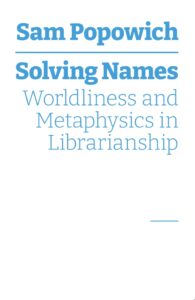Solving Names
Worldliness and Metaphysics in Librarianship
Author: Sam Popowich
Price: $60
Published: November 2024
ISBN: 978-1-63400-154-0
386 pages
“Solving Names” is the expression given by the American pragmatist philosopher William James for the metaphysical principles of the university that, once found, meant that no further debate or enquiry was needed. The quest for solving names was the quest for power over the universe, but for James such a search was bound to be fruitless, since rather than a solution, such names only indicate that more work needs to be done, that social reality can never be captured once-and-for-all, but must be confronted and chanted.
Modern librarianship relies on the construction of solving names as a way to ground debate, discussion, and consensus, but these solving names have the effect of disciplining, structuring, and constraining what is possible within the profession. Rather than being arbitrary, accidental, or contingent, Popowich argues that the metaphysical reliance on solving names serves a hegemonic purpose: the construction, maintenance, and reproduction of racial, settler-colonial, patriarchal capitalism. As an alternative, Popowich takes a broadly Marxist approach, proposing a shift towards “worldliness”, the recognition that all concepts are implicated in struggles over power and can never escape the constraints of material and social life. Adopting a worldly, non-metaphysical approach would require reconceiving such notions as freedom, democracy, common sense, and reason in order to confront the reality of power and social and political conflict. Solving Names is a contribution to the political philosophy of contemporary librarianship and an intervention in current debates around cancel culture, intellectual freedom, knowledge, reason, and technology.
Sam Popowich is a Canadian academic librarian in Winnipeg, Manitoba. He holds an MLIS from Dalhousie University and an MA in Music and Cultural Theory from Carleton University. He is also a PhD Candidate in Political Science at the University of Birmingham, researching the connections between Canadian libraries, politics, and intellectual freedom. Since 2007, he has worked at a number of Canadian universities, and has published numerous articles on politics, technology, and librarianship. He has contributed to The Politics of Theory and the Practice of Critical Librarianship, The Free Speech Wars, and Ethics in Linked Data, and is the author of Confronting the Democratic Discourse of Librarianship: A Marxist Approach (Library Juice Press, 2019). He is a section editor for the Journal of Radical Librarianship and a member of the Canadian Association of Professional Academic Librarians, the Canadian Political Science Association, and the University of Winnipeg’s Centre for Research in Cultural Studies.
